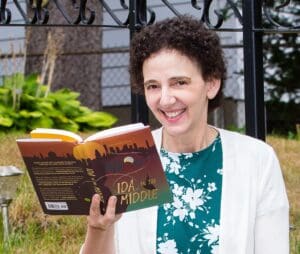I looked down on the garbage dump from my second-story apartment and pondered. How did I, born in Hollywood, end up in Beit Hanina, a 9-square mile section of East Jerusalem? Claimed by both Palestinians and Israelis as their capital, Jerusalem lives in relentless ambiguity.
I guess I always sought out the “in-between.” After high school, I ran as far away as I could get – Egypt. Studying in Cairo from 1983-1984 was transformational, yes, but also disruptive. How can anyone see the world one way again, after seeing it from the eyes of a Nubian doorman, an old Egyptian Jew, an Ethiopian migrant worker, a freed Palestinian political prisoner, and so many more? In all these people, I saw myself.
It was in 1984 in Haifa that I met the love of my life (who is sometimes a thorn in my side) and we lived nearly twenty years around Boston, Massachusetts. I was assistant professor of cross–cultural understanding at Bentley University, adjunct faculty at Lesley University, and facilitated anti‐racism, intercultural relations and organizational change with community groups, hospitals, grantmakers, government agencies and corporations. Some of this work was through a consulting company I founded, The Leagora Group, and some as a diversity curriculum designer for J. Howard & Associates. I was also the corporate cultural competence strategist for Harvard Vanguard Medical Associates. Previously, I had a number of activist jobs doing anti-war, feminist, and youth organizing. During the first Intifada (Palestinian uprising), I was coordinator of the Cambridge‐ Ramallah/El‐Bireh Sister City Campaign.
During those years, I completed my doctorate from Fielding University in Santa Barbara, California focused on social change and structural inequality; a Master of Arts degree in Intercultural Relations from Lesley University, with an emphasis on conflict management and training; and a master’s degree in Human Services from Fielding University which I added to my Bachelor of Arts degree in Middle East Studies from UCLA. I have also had several fellowships, including with Synergos Institute, the Palestinian American Research Center, and Northeastern University’s Middle East Center.
We moved to Palestine in 2004 so that our three daughters could grow up as comfortable and competent in their father’s Palestinian village as they already were in American suburbia. Actually, American suburbia had changed post-9/11. A generalized insecurity wafted through our schools, neighborhoods and media. When my oldest daughter asked, “Mommy, why do you make me be Arab when you don’t have to be?” we knew the United States shouldn’t be the only place our daughters consider “home.”
My husband took at job with the United Nations and I started consulting with Palestinian non‐governmental organizations, international NGOs, and UN agencies doing participatory research, strategic planning, community development, donor communications, capacity assessments, impact evaluations, fundraising, and other projects.
My immediate, profound shock at the distortions in Palestinian civil society caused by dependence on international aid led me to found Dalia Association (www.Dalia.ps), the first Palestinian community foundation, which I directed from 2006 to 2010. Dalia Association seeks to reduce dependence on international aid by reforming the international aid system; promoting local, diaspora and private sector philanthropy; and running “community-controlled grantmaking” programs that enhance civil society’s accountability to local communities. Dalia Association is one of my greatest accomplishments. I founded Aid Watch Palestine, an aid accountability in Gaza, but it hasn’t survived.
Now, I continue activism on many social justice issues and I write books. Information about my young adult novel, Ida in the Middle, is at www.idainthemiddle.com. Information about I Found Myself in Palestine: Stories of Love and Renewal From Around the Globe can be found at www.ifoundmyselfinpalestine.com. Information about Rest in My Shade: A Poem About Roots can be found at www.restinmyshade.com.
Yes, I have lived a thousand lives. I’ve visited the saints in Escipulas, Guatemala, frozen in the Chinese winter on a boat in Guiling, and smelled the legacy of slavery in the arid air of Namibia. Now, in midlife, I am surprised to find myself still hungry. I hunger for a kind of intimacy that writing fiction offers. My characters need me. Their problems implicate me. Telling their stories is both a duty and an honor.
Contact me at nora [at] noralestermurad [dot] com. Sign up for my newsletter in the footer on this site.
